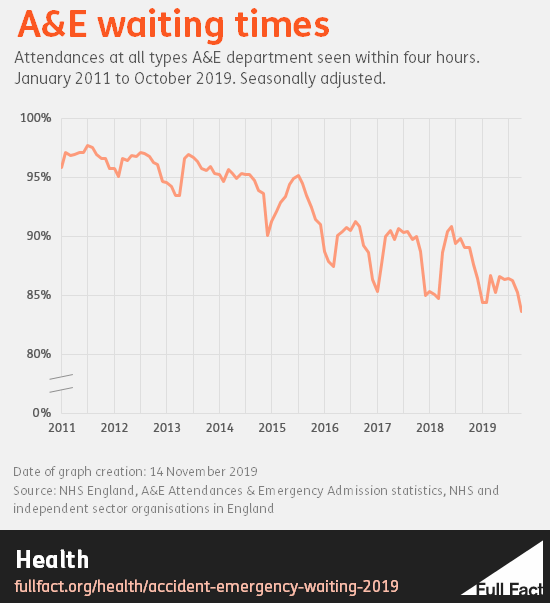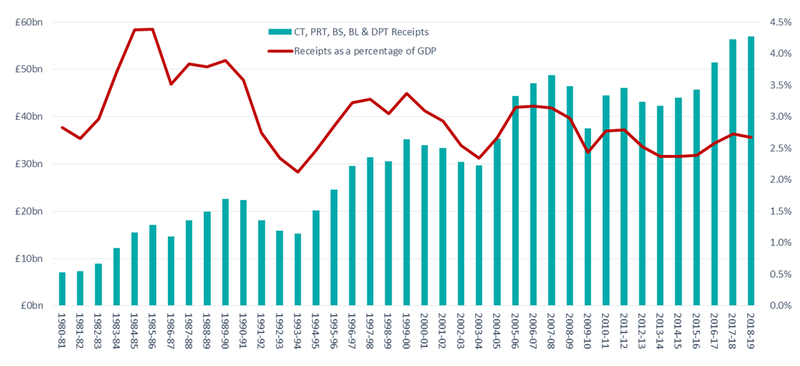Will Moy on Today
Here's a clip of Will Moy, our Chief Executive, on the Today programme this morning. He'll be appearing across TV and radio throughout the day.
Honesty in public debate matters
You can help us take action – and get our regular free email
Good morning!
Yesterday saw the first point during the election campaign when the leaders of the two main parties went head-to-head, in a debate on ITV.
As the debate got underway, the Conservative press office changed their Twitter logo and renamed their account ‘factcheckUK’, tweeting out “fact checks” which were supportive of Boris Johnson’s claims.
We criticised the Conservatives for this during the debate and you can hear more from our chief executive Will Moy who discussed the issue on BBC Radio 4’s Today Programme this morning.
The debate itself inevitably started with Brexit, with Jeremy Corbyn and Boris Johnson clashing over their Brexit timetables, and what Mr Johnson’s deal means for the Irish border.
Next up was the NHS, with claims about nurse vacancies, the extent of government funding, and whether the Conservatives have committed to build 40 hospitals, or to reconfigure six.
This was followed by a third main section on the economy, and topics covered included poverty, inequality, the UK’s economic performance, and corporation tax.
Both Corbyn and Johnson got some things wrong, and plenty of claims needed more context. You can read our assessment of last night’s claims here.
After an hour’s respite with I’m a Celebrity… ITV resumed the election coverage with interviews with the Lib Dems’ Jo Swinson, the SNP’s Nicola Sturgeon, The Brexit Party’s Nigel Farage, and the Green Party’s Sian Berry.
We’ll be posting fact checks of some choice claims throughout the day on our liveblog.
Some fact checks from the Green party manifesto
We’ve been taking a look at a number of claims in the Green Party’s manifesto, which was launched today. Here are our first two quick fact checks (we’ll keep looking into the other claims in the manifesto).
Claim: “Our century is only 19 years old, but already we have had 18 of the hottest years on record. This summer saw the hottest day ever recorded in the UK, and the hottest month ever recorded across the world.”
According to data from NASA, 18 of the 19 hottest years on record have happened since 2001 (the only other ‘hottest year’ that didn’t happen this century was in 1998).
The highest temperature ever recorded in the UK was recorded in July 2019. A high of 38.7 degrees celsius was reached in the Cambridge University Botanic Garden on 25 July.
According to the EU’s Copernicus Climate Institute, July 2019 was also “marginally” the warmest month ever recorded globally.
Claim: “15% of people... take 70% of flights.”
This is based on analysis of government survey data from 2014 (the data doesn’t seem to have been updated since then). We fact checked this in 2016 and found it was a reasonable estimate. Read more about our findings here.
NHS surcharge
Over the weekend the Conservative party announced plans to increase the immigration health surcharge for everyone coming to live and work in the UK to £625. In the announcement it said that at the moment those who are here on a work, study or family visa only pay a £400 surcharge to use the NHS.
It’s correct that the surcharge is currently £400, but claiming this is all that migrants pay into the NHS isn’t correct because it ignores the fact that immigrants pay taxes which go towards paying for things like the NHS.
You can read our fact check here.
How many horses in Kensington?
Right at the beginning of the election we criticised the Liberal Democrats for putting out information overstating their chances in parliamentary seats by using polling questions that ask about specific scenarios, rather than general voting intention.
We've recently seen an interesting new example of this approach.
On Sunday the Liberal Democrat candidate for Kensington Sam Gyimah (formerly of the Conservative party) tweeted out polling which asked voters in three London constituencies (including Kensington) who they would vote for if the only two parties with a realistic chance of winning were:
- Labour and the Conservatives, or
- the Liberal Democrats and the Conservatives.
In the Conservative/Labour head-to-head, the Conservatives “won” all three seats. But with a Conservative/Lib Dem head-to-head, the Lib Dems took all three.
Now this is all very interesting, but it’s not how elections actually work. Voters are not told which parties have a “realistic chance” when they’re in the polling booth. (The point of this kind of campaign technique, of course, is to try and convince voters of your favoured interpretation of the parties’ relative chances.)
So using that data, as, as Mr Gyimah did, to say that “Only the @LibDems can stop the Tories in Kensington” is pushing things a bit far—especially as Kensington is currently held by Emma Dent Coad, a Labour MP.
The poll to which Mr Gyimah refers also looked at the actual voting intention in Kensington, when respondents are not told that only two parties have a realistic chance.
It shows the Conservatives on 36%, the Lib Dems on 33%, and Labour on 27%. So the Lib Dems are polling ahead of Labour, but the data suggests all three parties have a competitive chance of taking the seat.
Good morning!
We're preparing for tonight's TV debate between Boris Johnson and Jeremy Corbyn, which we'll be live fact checking. We'll also be doing a roundup of the biggest claims from the show.
Elsewhere this morning, we've watched the Green party election 2019 manifesto launch - there wasn't much to fact check in the speeches, but we'll look through the manifesto document and have updates later today
We’re off to talkRADIO.
Tune into Eamonn Holmes’ show at 5.30pm to hear our editor, Tom Phillips, run through some of the biggest claims of the last week.
We’ll be covering maggots in orange juice, immigration numbers, misleading leaflets and Scottish GDP.
Honesty in public debate matters
You can help us take action – and get our regular free email
Digitally altered Diane Abbott video
Before this election started, concerns were raised about the possibility of “deepfake” videos being deployed during the campaign.
To date, we haven’t seen any deepfakes, other than deepfakes intended to warn people about the existence of deepfakes.
However, we have seen videos that use much cruder techniques.
Today we’ve seen a video spreading online of Diane Abbott, digitally altered to show her in clown makeup, and talking about why you should vote Labour.
It’s not difficult to see that the makeup has been digitally added to the video (you can see the original unedited video here.)
It’s notable because spoof subtitles have been added to the video, which becomes interesting when you take into account that many people watch videos on social media without sound. While this obviously isn’t intended to fool anyone, it might be worth bearing in mind that subtitles don’t necessarily reflect what’s actually being said in the video.
A&E waits: record levels—but data only goes back to 2010
Last week many media outlets reported that A&E waiting times had hit their “worst ever level”. This is technically correct, but it’s worth noting that comparable data only goes back to 2010.
In October 2019, 83.6% of patients attending all types of A&E departments (including things like dental A&E and urgent care centres) in England were admitted, transferred or discharged within four hours.

You can read our full fact check here.
Changing tax
This morning Conservative MP Andrea Leadsom appeared on BBC Radio 4’s Today programme, and among other things discussed her party’s plans for “a proper reform of business rates”. She didn’t specify exactly what this entails, but did say “business rates is the one tax that business organisations tell us isn’t working for them”.
Presenter Nick Robinson asked her several times how the Conservatives were going to fund a reduction in business rates.
After asking for the third time “where does the money come from?”, Ms Leadsom responded:
“You’re assuming money comes from somewhere. What I’m trying to explain to you is since our reduction in the headline rate of corporation tax, the HMRC’s tax take has actually increased by something like 45% because more businesses comply”.
Ms Leadsom did not go as far as to say a reform of business rates would be funded through a reduction in corporation tax, but she did suggest that lowering corporation tax was a way of potentially generating more revenue for the government.
A couple of hours later, Boris Johnson announced that the Conservatives would postpone their proposed further cuts in corporation tax, saying that this would free up £6 billion for the NHS.
Those slightly contradictory messages aside, it’s far from clear how far corporation tax reductions have increased tax revenue overall.
The government began reducing corporation tax at the start of 2011/12. Corporation tax revenues fell over the next couple of years, but then have increased in every year since 2014/15. They haven’t gone up by 45% in that period, though. They have increased by around 45% since 2009/10, but that was two years before the Conservatives started to reduce corporation tax, when tax revenues were at a low in the immediate aftermath of the financial crisis.
And revenues as a percentage of GDP have remained fairly flat over the past decade (and are relatively low by historic standards), as you can see on this helpful chart from HMRC’s tax receipts document.

There’s no way to definitively know how corporation tax reductions might have impacted other tax revenues (such as income tax), or to what extent they may have contributed more broadly to economic growth.
As we said last time we wrote about this, "the exact impacts on economic growth are hard to predict", although HMRC's estimates suggested that the previous corporation tax cuts could result in between 0.6% and 0.8% growth in GDP over 20 years.